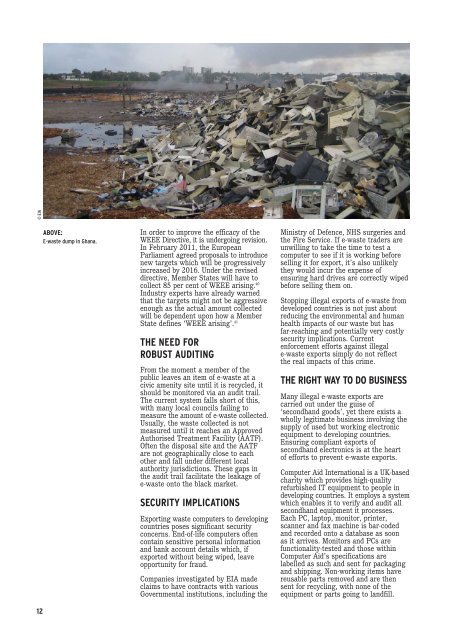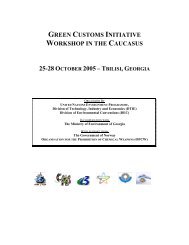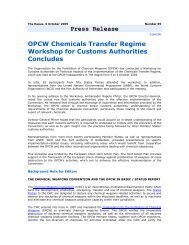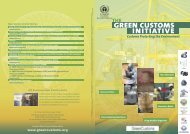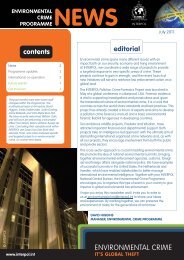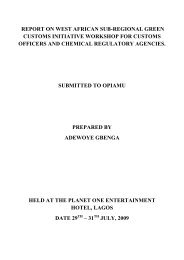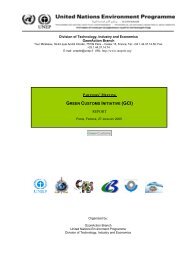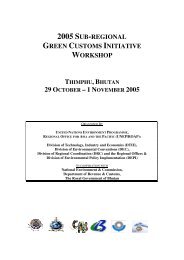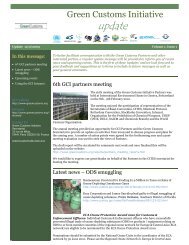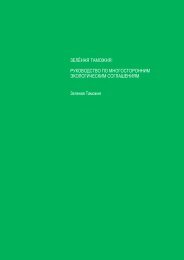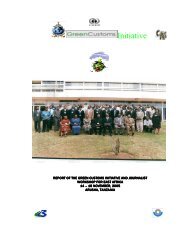EIA, "System Failure" - Green Customs Initiative
EIA, "System Failure" - Green Customs Initiative
EIA, "System Failure" - Green Customs Initiative
You also want an ePaper? Increase the reach of your titles
YUMPU automatically turns print PDFs into web optimized ePapers that Google loves.
© <strong>EIA</strong><br />
12<br />
ABOVE:<br />
E-waste dump in Ghana.<br />
In order to improve the efficacy of the<br />
WEEE Directive, it is undergoing revision.<br />
In February 2011, the European<br />
Parliament agreed proposals to introduce<br />
new targets which will be progressively<br />
increased by 2016. Under the revised<br />
directive, Member States will have to<br />
collect 85 per cent of WEEE arising. 40<br />
Industry experts have already warned<br />
that the targets might not be aggressive<br />
enough as the actual amount collected<br />
will be dependent upon how a Member<br />
State defines ‘WEEE arising’. 41<br />
THE NEED FOR<br />
ROBUST AUDITING<br />
From the moment a member of the<br />
public leaves an item of e-waste at a<br />
civic amenity site until it is recycled, it<br />
should be monitored via an audit trail.<br />
The current system falls short of this,<br />
with many local councils failing to<br />
measure the amount of e-waste collected.<br />
Usually, the waste collected is not<br />
measured until it reaches an Approved<br />
Authorised Treatment Facility (AATF).<br />
Often the disposal site and the AATF<br />
are not geographically close to each<br />
other and fall under different local<br />
authority jurisdictions. These gaps in<br />
the audit trail facilitate the leakage of<br />
e-waste onto the black market.<br />
SECURITY IMPLICATIONS<br />
Exporting waste computers to developing<br />
countries poses significant security<br />
concerns. End-of-life computers often<br />
contain sensitive personal information<br />
and bank account details which, if<br />
exported without being wiped, leave<br />
opportunity for fraud.<br />
Companies investigated by <strong>EIA</strong> made<br />
claims to have contracts with various<br />
Governmental institutions, including the<br />
Ministry of Defence, NHS surgeries and<br />
the Fire Service. If e-waste traders are<br />
unwilling to take the time to test a<br />
computer to see if it is working before<br />
selling it for export, it’s also unlikely<br />
they would incur the expense of<br />
ensuring hard drives are correctly wiped<br />
before selling them on.<br />
Stopping illegal exports of e-waste from<br />
developed countries is not just about<br />
reducing the environmental and human<br />
health impacts of our waste but has<br />
far-reaching and potentially very costly<br />
security implications. Current<br />
enforcement efforts against illegal<br />
e-waste exports simply do not reflect<br />
the real impacts of this crime.<br />
THE RIGHT WAY TO DO BUSINESS<br />
Many illegal e-waste exports are<br />
carried out under the guise of<br />
‘secondhand goods’, yet there exists a<br />
wholly legitimate business involving the<br />
supply of used but working electronic<br />
equipment to developing countries.<br />
Ensuring compliant exports of<br />
secondhand electronics is at the heart<br />
of efforts to prevent e-waste exports.<br />
Computer Aid International is a UK-based<br />
charity which provides high-quality<br />
refurbished IT equipment to people in<br />
developing countries. It employs a system<br />
which enables it to verify and audit all<br />
secondhand equipment it processes.<br />
Each PC, laptop, monitor, printer,<br />
scanner and fax machine is bar-coded<br />
and recorded onto a database as soon<br />
as it arrives. Monitors and PCs are<br />
functionality-tested and those within<br />
Computer Aid’s specifications are<br />
labelled as such and sent for packaging<br />
and shipping. Non-working items have<br />
reusable parts removed and are then<br />
sent for recycling, with none of the<br />
equipment or parts going to landfill.


